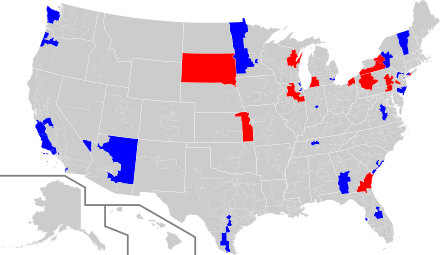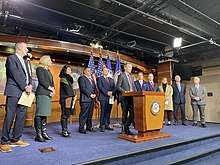Problem Solvers Caucus
The Problem Solvers Caucus is a bipartisan group in the United States House of Representatives that includes 48 members, equally divided between Democrats and Republicans, who seek to foster bipartisan cooperation on key policy issues. Created in January 2017, the group is currently co-chaired by Josh Gottheimer (D-NJ) and Tom Reed (R-NY).[5]
Problem Solvers Caucus | |
|---|---|
 | |
| Co-Chairs | Josh Gottheimer (D) Tom Reed (R) |
| Founded | January 23, 2017 |
| Ideology | Centrism[1] Bipartisanship[2] Big tent[3] |
| Political position | Center[4] |
| Colors | Red and Blue |
| Seats in House Democratic Caucus | 24 / 235 |
| Seats in House Republican Caucus | 24 / 197 |
| Seats in the House | 48 / 435
|
| Website | |
| problemsolverscaucus-gottheimer | |
| |


History
Writing in The New York Times about the formation of the Caucus, Reed and Gottheimer said: "We all knew the partisanship in Washington had gotten out of control and felt the need to create a bipartisan group committed to getting to "yes" on important issues. We have agreed to vote together for any policy proposal that garners the support of 75 percent of the entire Problem Solvers Caucus, as well as 51 percent of both the Democrats and Republicans in the caucus."[6] The Problem Solvers Caucus developed over time as an outgrowth of informal meetings organized by the political reform group No Labels.
Healthcare reform
During the week of August 4, 2017, the 43-member House Problem Solvers Caucus released a compromise to shore up the struggling insurance exchanges. The proposal focused on the skyrocketing cost of individual health insurance premiums. At the time, the Trump administration considered suspending cost-sharing payments that defray out-of-pocket payments like deductibles and co-payments, a move which insurers said could cause premiums to rise by 15 percent or more.[7]
The second part of the Problem Solvers plan would have provided relief to help states deal with the high cost of pre-existing and chronic conditions. The relief is provided through a dedicated stability fund that states could use to reduce premiums and limit losses for providing coverage for these high-cost patients. The third part of the plan provides relief to certain businesses from the mandate that they provide insurance to full-time employees. It also defines "full time" as a 40-hour workweek to discourage businesses from manipulating employees’ weekly hours to skirt the mandate.[6]
The plan would have also eliminated the Medical Device Tax, an excise charge of 2.3 percent that is often passed onto consumers and reduces funds for research and development.[7]
Membership
This group include 48 members: 24 Democrats and 24 Republicans.[8]
Democrats
- Ben McAdams of Utah
- Anthony Brindisi of New York
- Josh Harder of California
- Salud Carbajal of California
- Elaine Luria of Virginia
- Kendra Horn of Oklahoma
- Elissa Slotkin of Michigan
- Jim Costa of California
- Joe Cunningham of South Carolina
- Debbie Dingell of Michigan
- Vicente González of Texas
- Josh Gottheimer of New Jersey
- Susie Lee of Nevada
- Daniel Lipinski of Illinois
- Stephanie Murphy of Florida
- Tom O'Halleran of Arizona
- Jimmy Panetta of California
- Scott Peters of California
- Dean Phillips of Minnesota
- Max Rose of New York
- Bradley Schneider of Illinois
- Kurt Schrader of Oregon
- Darren Soto of Florida
- Abigail Spanberger of Virginia
- Tom Suozzi of New York
Republicans
- Mark Amodei of Nevada
- Brian Fitzpatrick of Pennsylvania
- Mike Gallagher of Wisconsin
- Don Bacon of Nebraska
- Dusty Johnson of South Dakota
- David Joyce of Ohio
- John Katko of New York
- Pete Stauber of Minnesota
- Bryan Steil of Wisconsin
- Anthony Gonzalez of Ohio
- Tom Reed of New York
- Lloyd Smucker of Pennsylvania
- Glenn Thompson of Pennsylvania
- Fred Upton of Michigan
- Jaime Herrera Beutler of Washington
- Steve Watkins of Kansas
- Will Hurd of Texas
- Bill Johnson of Ohio
Former members
Democrats
Republicans
- Mike Coffman of Colorado[15]
- Ryan Costello of Pennsylvania[16]
- Carlos Curbelo of Florida[17]
- Charlie Dent of Pennsylvania[18]
- John Faso of New York[19]
- Lynn Jenkins of Kansas[20]
- Tom MacArthur of New Jersey[21]
- Patrick Meehan of Pennsylvania[22]
- Illeana Ros Lehtinen of Florida[23]
- Dave Trott of Michigan[24]
- David Young of Iowa[25]
Media coverage
The Problem Solvers Caucus has been finding itself in the middle of several key battles and is "proving to be a force on Capitol Hill, one that's willing to leave some bruises in its wake but also to make common cause with its natural Senate allies".[26]
Mark Pocan, a former caucus member and co-chair of the Congressional Progressive Caucus, a left-leaning organization, says he was "duped" by No Labels and the PSC, saying that rather than "breaking gridlock", it is "a fast track for special interests and lobbyists."[27]
References
- Nilsen, Ella (November 26, 2018). "Nancy Pelosi's Problem Solvers Caucus problem, explained". Vox. Retrieved August 5, 2019.
- Laslo, Matt (April 20, 2019). "U.S. House Democrats say squabbles are healthy sign as they move past 100 days". WHYY-TV. NPR. Retrieved August 5, 2019.
- Cannon, Carl M. (March 25, 2018). "Tiny Tent Political Parties". RealClearPolitics. Retrieved August 6, 2019.
- "Centrist lawmakers band together to demand House reforms for the next speaker". The Washington Post. Retrieved August 5, 2019.
- Leaf, Clifton. "Don't Tell a Soul: There's a Secret Bipartisan Health Plan". Fortune. Retrieved 2017-08-12.
- Gottheimer, Josh; Reed, Tom (2017-08-04). "Let's Stop the Bickering and Fix the Health Care System". The New York Times. ISSN 0362-4331. Retrieved 2017-08-12.
- Gottheimer, Josh; Reed, Tom (2017-08-04). "Opinion | Let's Stop the Bickering and Fix the Health Care System". The New York Times. ISSN 0362-4331. Retrieved 2020-05-24.
- "Featured Members". Problem Solvers Caucus. Retrieved 2020-05-24.
- "Rep. Elizabeth Esty Won't Seek Re-Election in Wake of Abusive Staffer Disclosures". Roll Call. Retrieved 2020-05-24.
- Eric Bradner; Terence Burlij. "Dem's retirement gives Republicans a pickup opportunity". CNN. Retrieved 2020-05-24.
- Schneier, Matthew (2019-01-09). "Colorado's Got a Gay Governor. Who Cares?". The New York Times. ISSN 0362-4331. Retrieved 2020-05-24.
- Dixon, Darius. "Jacky Rosen unseats Dean Heller in Nevada Senate race". POLITICO. Retrieved 2020-05-24.
- "Problem Solvers Caucus creates problem for Nancy Pelosi". 2018-11-24. Retrieved 2020-05-24.
- Romero, Simon (2018-11-12). "Kyrsten Sinema Declared Winner in Arizona Senate Race". The New York Times. ISSN 0362-4331. Retrieved 2020-05-24.
- Swanson, Ian (2018-11-06). "Coffman loses GOP seat in Colorado". TheHill. Retrieved 2020-05-24.
- Pramuk, Jacob (2018-03-26). "Republican Rep. Ryan Costello will retire, making it tougher for GOP to hold House majority". CNBC. Retrieved 2020-05-24.
- Harder, Amy. "Carlos Curbelo, Republican leader on climate, loses tight Florida race". Axios. Retrieved 2020-05-24.
- Cheney, Kyle; Schneider, Elena. "Dent resigns, to leave Congress next month". POLITICO. Retrieved 2020-05-24.
- Foderaro, Lisa W. (2018-11-07). "Antonio Delgado Upsets John Faso as 3 House Republicans Fall to N.Y. Democrats". The New York Times. ISSN 0362-4331. Retrieved 2020-05-24.
- Marcos, Cristina (2017-01-25). "Rep. Jenkins retiring from public office in 2018". TheHill. Retrieved 2020-05-24.
- Hellmann, Jessie (2018-11-14). "MacArthur loses New Jersey House race to Democratic challenger Andy Kim". TheHill. Retrieved 2020-05-24.
- Levy, Marc; Fram, Alan. "U.S. Rep. Pat Meehan resigns after sexual harassment charge". mcall.com. Retrieved 2020-05-24.
- "Rep. Ileana Ros-Lehtinen, 1st Cuban-American in Congress, to retire". The Denver Post. The Associated Press. 2017-04-30. Retrieved 2020-05-24.
- Burke, Melissa Nann. "Insider: GOP Rep. Trott retires to avoid 'dialing for dollars'". Detroit News. Retrieved 2020-05-24.
- Ta, Linh. "Republican Rep. David Young in defeat: 'Tonight the people, unfortunately, didn't choose our ideas'". Des Moines Register. Retrieved 2020-05-24.
- "Tom Reed's 'Problem Solvers' solve a problem, making enemies and friends in the process". The Buffalo News. 2019-07-08. Retrieved 2020-05-04.
- Pocan, Rep Mark (2018-12-04). "'No Labels' Needs A Warning Label". Huffington Post. Retrieved 2018-12-05.